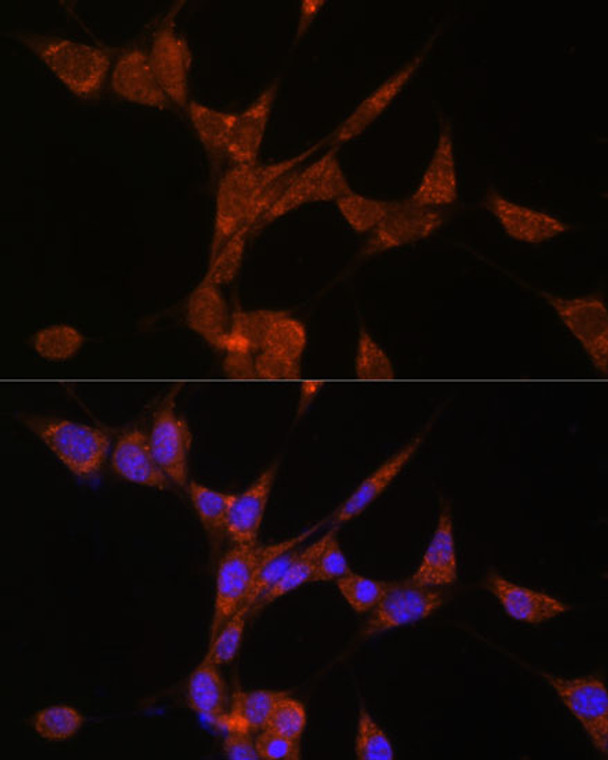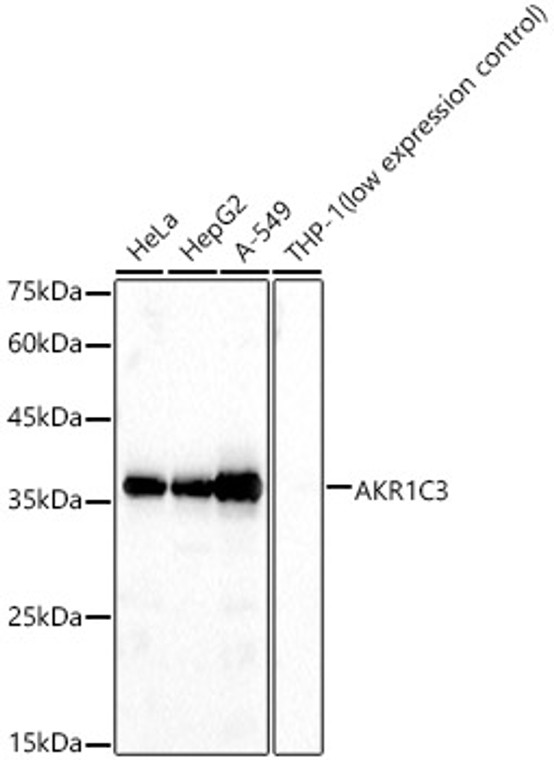| Host: |
Rabbit |
| Applications: |
WB/IF/ICC/IP/ELISA |
| Reactivity: |
Human/Mouse |
| Note: |
STRICTLY FOR FURTHER SCIENTIFIC RESEARCH USE ONLY (RUO). MUST NOT TO BE USED IN DIAGNOSTIC OR THERAPEUTIC APPLICATIONS. |
| Clonality: |
Polyclonal |
| Conjugation: |
Unconjugated |
| Isotype: |
IgG |
| Formulation: |
PBS with 0.05% Proclin300, 50% Glycerol, pH 7.3. |
| Purification: |
Affinity purification |
| Concentration: |
Lot specific |
| Dilution Range: |
WB:1:500-1:1000IF/ICC:1:50-1:200IP:0.5 Mu g-4 Mu g antibody for 200 Mu g-400 Mu g extracts of whole cellsELISA:Recommended starting concentration is 1 Mu g/mL. Please optimize the concentration based on your specific assay requirements |
| Storage Instruction: |
Store at-20°C for up to 1 year from the date of receipt, and avoid repeat freeze-thaw cycles. |
| Gene Symbol: |
AKR1C3 |
| Gene ID: |
8644 |
| Uniprot ID: |
AK1C3_HUMAN |
| Immunogen Region: |
1-323 |
| Specificity: |
Recombinant fusion protein containing a sequence corresponding to amino acids 1-323 of human AKR1C3 (NP_003730.4). |
| Immunogen Sequence: |
MDSKHQCVKLNDGHFMPVLG FGTYAPPEVPRSKALEVTKL AIEAGFRHIDSAHLYNNEEQ VGLAIRSKIADGSVKREDIF YTSKLWSTFHRPELVRPALE NSLKKAQLDYVDLYLIHSPM SLKPGEELSPTDENGKVIFD IVDLCTTWEAMEKCKDAGLA KSIGVSNFNRRQLEMILNKP GLKYKPVCNQVECHPYFNRS KLLDFCKSKDIVLVAYSALG SQRDKRWVDPNSPVLLEDP |
| Tissue Specificity | Expressed in many tissues including adrenal gland, brain, kidney, liver, lung, mammary gland, placenta, small intestine, colon, spleen, prostate and testis. High expression in prostate and mammary gland. In the prostate, higher levels in epithelial cells than in stromal cells. In the brain, expressed in medulla, spinal cord, frontotemporal lobes, thalamus, subthalamic nuclei and amygdala. Weaker expression in the hippocampus, substantia nigra and caudate. |
| Function | Cytosolic aldo-keto reductase that catalyzes the NADH and NADPH-dependent reduction of ketosteroids to hydroxysteroids. Acts as a NAD(P)(H)-dependent 3-, 17- and 20-ketosteroid reductase on the steroid nucleus and side chain and regulates the metabolism of androgens, estrogens and progesterone. Displays the ability to catalyze both oxidation and reduction in vitro, but most probably acts as a reductase in vivo since the oxidase activity measured in vitro is inhibited by physiological concentration of NADPH. Acts preferentially as a 17-ketosteroid reductase and has the highest catalytic efficiency of the AKR1C enzyme for the reduction of delta4-androstenedione to form testosterone. Reduces prostaglandin (PG) D2 to 11beta-prostaglandin F2, progesterone to 20alpha-hydroxyprogesterone and estrone to 17beta-estradiol. Catalyzes the transformation of the potent androgen dihydrotestosterone (DHT) into the less active form, 5-alpha-androstan-3-alpha,17-beta-diol (3-alpha-diol). Also displays retinaldehyde reductase activity toward 9-cis-retinal. |
| Protein Name | Aldo-Keto Reductase Family 1 Member C3 17-Beta-Hydroxysteroid Dehydrogenase Type 517-Beta-Hsd 53-Alpha-Hsd Type Ii - Brain3-Alpha-Hydroxysteroid Dehydrogenase Type 23-Alpha-Hsd Type 2Chlordecone Reductase Homolog HakrbDihydrodiol Dehydrogenase 3Dd-3Dd3Dihydrodiol Dehydrogenase Type IHa1753Prostaglandin F SynthasePgfsTestosterone 17-Beta-Dehydrogenase 5 |
| Database Links | Reactome: R-HSA-193368Reactome: R-HSA-193775Reactome: R-HSA-193807Reactome: R-HSA-2162123Reactome: R-HSA-5365859Reactome: R-HSA-975634 |
| Cellular Localisation | Cytoplasm |
| Alternative Antibody Names | Anti-Aldo-Keto Reductase Family 1 Member C3 antibodyAnti-17-Beta-Hydroxysteroid Dehydrogenase Type 5 antibodyAnti-17-Beta-Hsd 5 antibodyAnti-3-Alpha-Hsd Type Ii - Brain antibodyAnti-3-Alpha-Hydroxysteroid Dehydrogenase Type 2 antibodyAnti-3-Alpha-Hsd Type 2 antibodyAnti-Chlordecone Reductase Homolog Hakrb antibodyAnti-Dihydrodiol Dehydrogenase 3 antibodyAnti-Dd-3 antibodyAnti-Dd3 antibodyAnti-Dihydrodiol Dehydrogenase Type I antibodyAnti-Ha1753 antibodyAnti-Prostaglandin F Synthase antibodyAnti-Pgfs antibodyAnti-Testosterone 17-Beta-Dehydrogenase 5 antibodyAnti-AKR1C3 antibodyAnti-DDH1 antibodyAnti-HSD17B5 antibodyAnti-KIAA0119 antibodyAnti-PGFS antibody |
Information sourced from Uniprot.org
12 months for antibodies. 6 months for ELISA Kits. Please see website T&Cs for further guidance







![Western blot analysis of lysates from wild type (WT) and ERCC1 knockout (KO) HeLa cells, using [KO Validated] ERCC1 Rabbit polyclonal antibody (STJ11100039) at 1:1000 dilution. Secondary antibody: HRP Goat Anti-Rabbit IgG (H+L) (STJS000856) at 1:10000 dilution. Lysates/proteins: 25 Mu g per lane. Blocking buffer: 3% nonfat dry milk in TBST. Detection: ECL Basic Kit. Exposure time: 90s. Western blot analysis of lysates from wild type (WT) and ERCC1 knockout (KO) HeLa cells, using [KO Validated] ERCC1 Rabbit polyclonal antibody (STJ11100039) at 1:1000 dilution. Secondary antibody: HRP Goat Anti-Rabbit IgG (H+L) (STJS000856) at 1:10000 dilution. Lysates/proteins: 25 Mu g per lane. Blocking buffer: 3% nonfat dry milk in TBST. Detection: ECL Basic Kit. Exposure time: 90s.](https://cdn11.bigcommerce.com/s-zso2xnchw9/images/stencil/300x300/products/89111/357565/STJ11100039_1__56308.1713121691.jpg?c=1)

